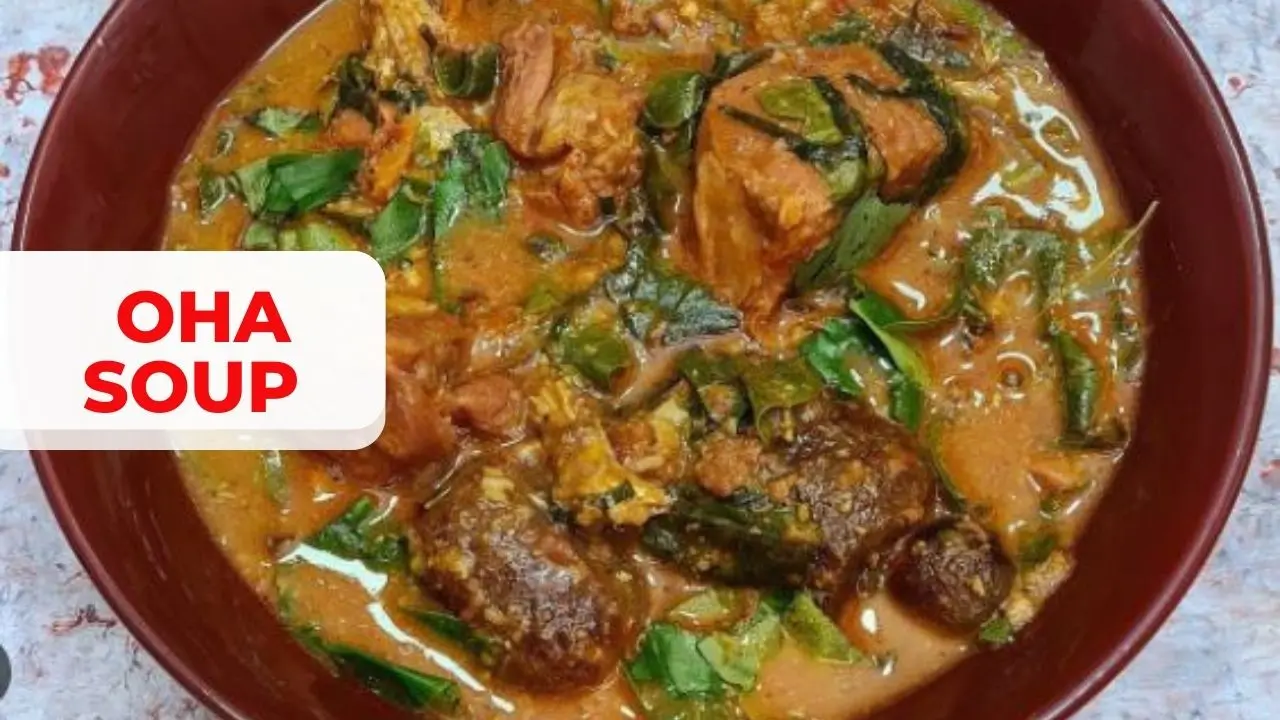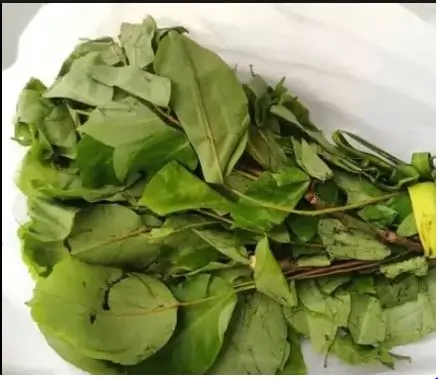
Oha soup is a traditional Nigerian soup known for its distinctive taste and unique aroma. Made from tender ora leaves, assorted meats, and traditional ingredients, this soup is a delight to the taste buds. Oha soup is commonly enjoyed in southeastern Nigeria and is often served with fufu, pounded yam, or other swallow foods.
But why is it called African rosewood soup? Well, the name comes from the fact that ora leaves are from a tree that belongs to the same genus as African rosewood, which is a valuable timber species.
This article will explore everything you need to know about Oha soup, including its history, health benefits, ingredients, and preparations. By the end of this article, you will better understand this delicious dish and be inspired to try it yourself or share it with others. Let’s begin!
The History and Origin of Oha Soup
Oha soup is one of the most popular delicacies in Igboland. It is native to the Igbo people of states like Anambra, Enugu, Ebonyi, Abia, and Imo. Oha symbolises cultural identity among the Igbo people of Eastern Nigeria. The soup is one of Igbo’s most famous Foods.
It is often prepared for special occasions such as weddings, festivals, ceremonies, or celebrations. It is also considered a comfort food to soothe one’s soul during stress or sorrow.
The Igbo people and other ethnic groups in Nigeria and beyond appreciate it. It has been exported to other countries where Nigerians live or visit, such as Ghana, Cameroon, South Africa, the United States, the United Kingdom, Canada, etc.
The Health Benefits of Oha Soup
Oha soup is not only delicious but also nutritious. It has many health benefits that can improve well-being and prevent or treat various diseases. Some of the health benefits are:
- It is rich in antioxidants that can protect the body from free radicals that cause oxidative stress and inflammation. Antioxidants can also boost the immune system and prevent infections, cancer, diabetes, and other chronic diseases.
- It is high in fibre, which can aid digestion and prevent constipation. Fibre can also lower cholesterol and blood sugar levels and reduce the risk of heart disease and diabetes.
- It is a good source of protein that can provide essential amino acids for the growth and repair of tissues, muscles, bones, skin, hair, and nails. Protein can also help regulate hormones, enzymes, and antibodies vital for the body’s functions.
- It is low in calories and fat, which can help maintain a healthy weight and prevent obesity. It can also provide a feeling of fullness and satisfaction, reducing appetite and cravings.
- It contains vitamins and minerals that can support various bodily processes and systems. Some vitamins and minerals in the soup are vitamin A, C, vitamin K, vitamin B complex, iron, calcium, magnesium, potassium, zinc, etc.
Oha Soup Ingredients List
Oha soup has various ingredients that give it flavour, texture, colour, and aroma. The main ingredients of the soup are:
- Ora Leaves: The tender, slightly bitter leaves that give Oha soup its signature flavour They are torn by hand rather than cut to preserve texture.
- Cocoyam Paste: Made from boiled and pounded cocoyam. It thickens and adds flavour to the soup. It can be substituted with other thickeners.
- Palm Oil gives the soup its distinctive colour and flavour.
- Assorted Meats and Fish: Different protein sources like beef, goat, chicken, cow skin, stockfish, etc. Cooked separately, then added.
- Seasonings and Spices:
- Crayfish: adds savoury seafood flavour
- Pepper: Provides spiciness and heat
- Ogiri: fermented seasoning that gives an earthy flavour
- Salt
- Seasoning cubes (Maggi)
- Onions
- Uziza leaves or seeds (optional)
- Uda pods (optional)
How to Prepare Oha Soup (African Rosewood Soup)
This delicacy is easy to cook. It can be done in less than an hour with the following steps:
- Wash and season the assorted meats and fish with salt, pepper, onions, seasoning cubes or powder, etc. Boil them in a pot with enough water until tender and soft. Reserve the stock for later use.
- Peel, wash, and boil the cocoyams in another pot with enough water until they are soft and cooked. Drain the water and pound the Cocoyam into a smooth paste with a mortar and pestle.
- Wash the Ora leaves thoroughly and tear them into small pieces by hand. Set them aside for later use.
- Heat some palm oil in a large pot over medium-high heat. Add some chopped onions and fry for a few minutes until they are soft.
- Add crayfish, pepper, ogiri, salt, seasoning cubes or powder, uziza leaves, or seeds. Stir well and fry for another few minutes until they are well combined.
- Add reserved stock from the meats and fish and allow it to boil for a few minutes. Add more seasonings to taste if the taste still needs to be good.
- Add the mashed or blended Cocoyam and stir well until it dissolves in the soup. The soup should be thick, but not too thick. Add more stock or water if needed.
- Add the meats and fish and simmer for 10 minutes until they are well-soaked in the soup.
- Add the ora leaves and stir gently to mix with the soup. Avoid overcooking the Ora leaves, which can lose their flavour and colour. Allow the soup to cook for about 5 minutes before dropping it.
- Turn off the heat and serve hot with Fufu or Eba (Garri)
How to Enjoy African Ora Soup
Oha soup is best served hot with any type of swallow food, such as fufu, pounded yam, eba, semolina, amala, or others.
Oha soup can also be served with boiled rice, plantains, yams, etc. However, these may not be as satisfying as swallow foods. Here’s a list of foods you can enjoy with your well-prepared and delicious Ora Soup:
- Oha Soup and Fufu
- Oha Soup and Rice
- Oha Soup and SEMO
- Oha Soup and Garri
- Oha Soup and Eba
- Oha Soup, Pounded Yam, and much more
Storage of Oha Soup
Oha soup can be stored in an airtight container in the refrigerator for up to 3 days or in the freezer for up to a month or more, depending on how well your freezer works or your power supply.
To reheat and use it, remove it from the freezer, add the quantity you need to a pot, and then warm it on the stove or microwave. Then, serve with the Swallow of your choice.
The Challenges Oha Soup
Oha Soup is not without its challenges and controversies. Some of the issues that surround Ora Soup are:
- The availability of ora leaves: Ora leaves are challenging to find outside Igboland, Nigeria, or Africa. They are seasonal and scarce in some regions. They are also expensive and sometimes adulterated with other leaves that look similar but have different tastes.
- The sustainability of ora trees: Ora trees are endangered due to deforestation, overharvesting, climate change, etc. They take a long time to grow and regenerate. They are also not widely cultivated or conserved by farmers or authorities.
- The authenticity of ora soup: ora soup has many variations depending on one’s preference, availability, and location. Some people may use different ingredients or methods to make the Soup.
Oha Soup is From Which State?
This delicious and nutritious Soup originates from southeastern Nigeria, especially among the Igbo people. It is native to the Igbo people of states like Anambra, Enugu, Ebonyi, Abia, and Imo.
Can a Pregnant Woman Eat Oha Soup?
Yes, a pregnant woman can eat Oha soup if she is not allergic to any ingredients. It provides essential nutrients for the mother and the baby, such as iron, calcium, vitamin A, and protein.
However, pregnant women should be careful not to overeat Soup, as it can also contain high amounts of sodium, cholesterol, and saturated fat, increasing the risk of hypertension, preeclampsia, and gestational diabetes.
Pregnant women should also avoid eating Soup with uncooked or undercooked meat or fish, as they can contain harmful bacteria or parasites that can cause infections or miscarriages.
Can a Nursing Mother Eat Oha Soup?
Yes, a nursing mother can eat Oha soup, as it can help boost her milk production and quality. Oha Soup contains galactagogues, which are substances that stimulate lactation. Some galactagogues in Oha Soup are palm oil, uziza seeds, and ogiri. Oha Soup can also provide essential nutrients for the mother and the baby, such as iron, calcium, vitamin A, and protein.
However, nursing mothers should also be mindful of the amount and frequency with which they eat the Soup, as it can also contain high amounts of sodium, cholesterol, and saturated fat, affecting their weight and health.
Is Oha Soup Good for Ulcer Patients?
The Soup may not be suitable for ulcer patients as it can worsen the condition of the stomach lining. Oha Soup contains acidic and spicy ingredients, such as palm oil, pepper, and ogiri, which can irritate the ulcer and cause more pain and bleeding.
Ora soup also contains high amounts of fat and oil, which can delay gastric emptying and increase acid secretion in the stomach.
Ulcer patients should avoid eating Ora soup or any other food that can aggravate their symptoms. Instead, they should eat soft foods that can soothe and heal the ulcer.
Is Oha Soup Good for Weight Loss?
Oha soup is not suitable for weight loss as it is high in calories and fat. Oha soup contains palm oil, one of the world’s most calorie-dense oils. One tablespoon of palm oil contains about 120 calories and 14 grammes of fat.
The soup also contains assorted meats and fish, which can add more calories and fat to the dish. Oha soup is usually eaten with fufu or pounded yam, which are also high in carbohydrates and calories. Overeating Ora soup can lead to weight gain and obesity.
One should eat less Ora soup or substitute some ingredients with healthier options to lose weight. For example, one can use less palm oil, lean meat, or fish instead of fatty ones, add more vegetables such as spinach or ugu, and eat smaller portions of fufu or pounded yam.
What Ingredient Makes Soup Thicker?
Different ingredients can make the soup thicker, depending on the type and texture of the soup. Some of the common thickeners for soups are:
- Cornstarch: Cornflour or Starch is a starch-based thickener that can be used for soups. Cornstarch forms a gel with water or stock that binds the other ingredients in the soup. To use cornstarch as a thickener, mix it with cold water or stock first to avoid lumps; then add it to the hot soup while stirring constantly, and cook until the desired thickness is achieved.
- Cocoyam is the most popular way to make the soup thick and is one of the most significant ingredients.
Conclusion
Oha soup is a delicious dish with a lot to offer regarding taste, nutrition, culture, history, etc. It is a dish that can be enjoyed by anyone who loves good food and wants to experience something different and unique. Oha soup is a dish that can bring people together and celebrate their diversity and identity.
If you have never tried Ora soup before, we encourage you to try it and see why it is so popular and loved by many. If you have tried Ora soup before, we hope this article has given you more insight and appreciation.
We hope you have enjoyed reading this article and learned something new and exciting about Ora soup. The soup is one of Igbo’s most famous Foods.






